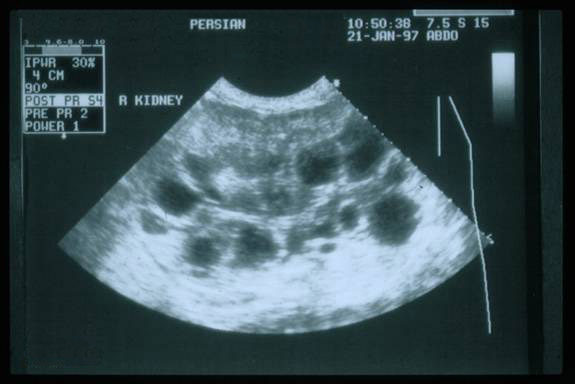CATS
Thomas
Sophie
Becky
Harry
Chloe
George
Polly
Noggy
Charlie
Jessica
Misty
Martha
Amy
Theo
Oscar
Esme
Feral Neutering
Cat Proof Garden
TORTOISES
Shelley
Nancy
Hibernation
HEDGEHOGS
Faithful
Oliver
Bruce
Buster
Uvey
Tiggie
LINKS
HOME PAGE

Polycystic Kidney Disease is a hereditary disease commonly found in Persian and Exotic cats. Though it is most prevalent in these breeds, it is also found in American Curls, American Shorthairs, Siamese and Scottish Folds. It has even been found in domestic and feral cats.
The disease itself is caused by one abnormal gene, and just one positive parent will pass it on to at least a portion of the kittens, even if the other parent is negative. It is estimated that one third of all Persians and Exotics have this disease. In a typical cattery setup, it is possible for 30% of the breeding cats to have, and pass on, PKD. Only catteries that test for PKD and only breed negative parents will have no instances PKD.
Polycystic Kidney Disease
is where fluid filled cysts grow inside the kidneys. It can grow slowly
or quickly and range anywhere from a cat having only two or three cysts
to a cat having kidneys that are literally filled with cysts.
What are the symptoms?
There are basically no symptoms. A cat with slow growing PKD may live
to a ripe old age, while a kitten with rampant, fast growing PKD could
die as early as a few weeks old or even be born dead. The thing is,
no one can predict whether an individual cat has slow growing or fast
growing PKD. Some cats die of something else entirely before the PKD
takes them, while the majority of cats seem to die around seven to eight
years old of renal failure.
Can PKD be cured?
There is no cure for PKD, it can however, be prevented by responsible
breeders not breeding cats who test positive for PKD! Up until recently
an expensive ultrasound was the only way to test for PKD, but now there
is a DNA test that will show whether or not a cat has PKD. A good breeder
will have their cats screened and never breed a PKD positive cat. A
caring and responsible pet owner should make certain that their kitten’s
parents have both tested negative for PKD. It is the only way to stop
this disease!
Why don't more breeders know about PKD?
Owners who don’t know why their cat died or who have lost touch
with their breeder simply do not pass this important information on
to a breeder, so for years, breeders have been breeding PKD positive
cats.
Only breeders who have a post-mortem done may even known what their
cat died from and also since many breeders retire cats at between 5
and 6 years of age, a cat that dies of renal failure at 7 or 8 years
old may also go unnoticed. So, much of the Persian breeding stock can
carry PKD, but with today’s testing methods, there is no longer
an excuse for continuing to breed PKD positive cats.
More information about PKD please visit FAB
(Feline Advisory Bureau).
